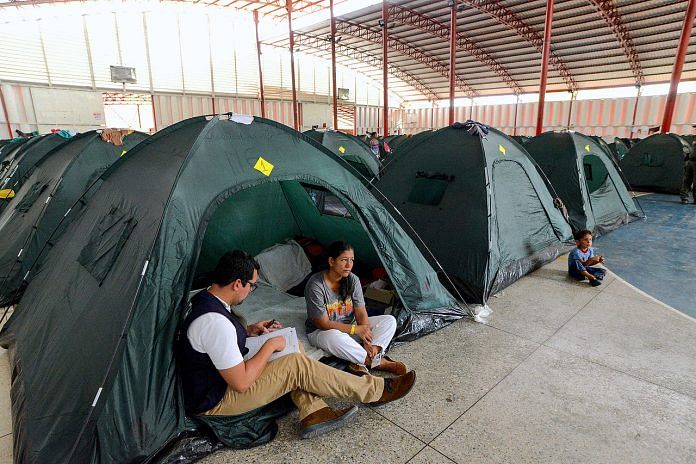The crisis is spilling across the border
The human outflow from Venezuela is now more than 1.1 million people, according to United Nations reports— which makes it the largest displacement of people in Latin America. “But Venezuela’s refugees are attracting far less attention or international aid than those fleeing Burma or Syria. That needs to change,” editorializes the Washington Post.
Colombia has accepted more than 600,000 people, and tens of thousands are in Brazil. More than 60,000 appeals are pending in the United States. Why is the crisis so bad? “Though it controls the world’s largest oil reserves, the regime founded by Hugo Chávez has wrecked not just oil production but the economy as a whole, leaving stores empty of food and hospitals deprived even of common medicines. Inflation is skyrocketing above the 2017 rate of 2,600 percent, and rampant homicide has made Caracas one of the most dangerous cities in the world.”
What’s making the crisis worse is Nicolas Maduro’s refusal to accept humanitarian aid, which he sees as foreign involvement. “Rather than take basic steps to feed people or stabilize the economy, Mr. Maduro, steered by Cuban advisers, is preparing to stage a rigged election for every office in the country in April, which would allow for the elimination of all formal political opposition. The regime already put down a pro-democracy uprising last year with mass repression that led to more than 120 deaths.”
“But though the United Nations’ refugee agency is on the ground in Colombia and Brazil, the response has been nothing like that devoted to servicing refugees from Syria or Burma,” the Washington Post points out. “With no solution to the crisis inside Venezuela in sight, it’s time for the United States and other nations to do more to mitigate its external impact.”
Tweedledee and Tweedletrump
“When Justin Trudeau first met Donald Trump face-to-face last February, the contrast between the Canadian prime minister and the American president couldn’t have been any sharper,” writes Martin Patriquin in the New York Times. “Mr. Trudeau, worldly and dapper, can barely open his mouth without extolling Canada’s cheery multiculturalism or its open-border globalism. Mr. Trump lurches from thinly concealed xenophobia to America-first protectionism by way of insults and tirades.”
Canada and the United States have lived in communal harmony for over a century. The only real bone of contention (that could arise, but hasn’t yet) is over trade, and keeping the North American Free Trade Agreement (Nafta) negotiations alive. “And so far, Canada has remained on the good side of Mr. Trump and his Twitter feed, while the president’s ire is mostly directed at the other Nafta partner, Mexico.”
Trudeau has practiced “deft diplomacy” with the Trump, which Patriquin says has paid off domestically. “Canadians appreciate that Mr. Trudeau’s policy positions and demeanor are decidedly anti-Trump. And yet, by staying in Mr. Trump’s good graces, Mr. Trudeau also avoids the pain that would come from clashing with his counterpart in the United States. This boost has been a big help for Mr. Trudeau as his government feels the effects of middle age.”
“Domestically, Mr. Trudeau’s eternal optimism would be blunted should the Nafta negotiations collapse. Even if it were prompted by Mr. Trump’s scorched-earth nationalism, a failure of Nafta would nonetheless be an enormous political liability for Mr. Trudeau’s government, and a stain on his eventual legacy.”
“Still, by staying true to his politics while remaining on Mr. Trump’s good side, Mr. Trudeau has earned continued support of Trump-wary Canadians. To the surprise of many Canadians, Mr. Trump has so far proved to be crucial to Mr. Trudeau’s political success,” Patriquin writes.
How to fix South Africa
“The new president of South Africa, Cyril Ramaphosa, has a heck of a mess to clear up,” writes The Economist. The country is riddled with corruption, unemployment and public debt are incredibly high, and education and healthcare are failing miserably. To cap it all off, Cape Town is running out of water.
“Mr Ramaphosa needs to move fast to restore the rule of law, revive investor confidence and fix public services. He should start by hiring good people,” the Economist argues. “To get South Africa working again, crooked and inept backsides must be removed from powerful seats.”
“Mr Ramaphosa cannot begin to reform South Africa without honest and capable public servants running the state and its companies. If he leaves the worst people from the Zuma era in place, they will continue to bilk and bungle—and Mr Ramaphosa’s presidency will end in failure. Now, when voters have such high hopes, is the time to act.”
First, he should ensure that the right people are in charge of the financial and criminal justice system. Then, the administration should be fixed.
“Mr Ramaphosa should not be vindictive and, mindful of the precedent, he should be seen to be fair. But if he appoints good investigators and prosecutors and lets them do their jobs without interference, it is a fair bet that they will look into the many allegations of skulduggery against Mr Zuma’s pals. If malefactors in high places are dealt with firmly and impartially, that will deter others and signal to investors that the rule of law still applies in South Africa. Meanwhile, Mr Ramaphosa will be able to start on the other tasks in his gigantic in-tray.”



